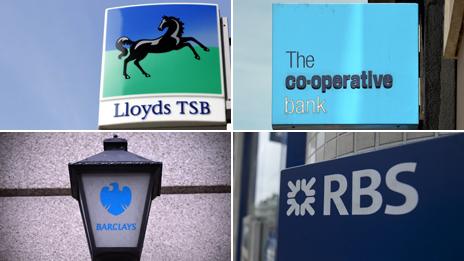Four banking tales
- Published
- comments

Here is a tale of four big British banks - RBS, Barclays, Co-op Bank and Lloyds, all doing interesting stuff five years after the great banking crash, not all of it good news, but none of it threatening (phew) to the wealth of savers.
Let's start with Royal Bank of Scotland - since I have learned a little smidgeon of new news.
RBS is close to announcing the sale, forced by the European Commission, of a small business banking operation (315 branches serving 250,000 small businesses and two million retail customers).
What I have learned is that the offer from a consortium of mainstream investment institutions, led and chaired by the former Tesco finance director, Andy Higginson, has been rejected.
Its rejection by RBS may spark some controversy, since its offer was the only one to offer de facto full separation from the off, with a plan to float the whole thing on the London Stock Exchange.
However RBS's board has concluded that the two other offers, from private equity consortia - one led by Corsair and the other by Blackstone - offer better value, in that they both involve RBS keeping a stake in the separated small-business bank for a while, which should allow it to share in any future increase in the value of the bank.
Now Barclays, which yesterday formally launched its jumbo rights issue to raise £5.8bn.
The rights-issue prospectus discloses that it has been warned by the Financial Conduct Agency that it has been found guilty of breaching London rules for raising money from the sale of listed securities.
This may sound terribly technical and dull, and Barclays is contesting the findings, but the implications of the FCA's verdict are serious.
To be clear, it is not the proposed fine of £50m which is the big headache for Barclays.
The much bigger concern is the FCA's conclusion that a £322m payment by Barclays to Qatar Holdings, an investment arm of the Qatari state, was to "make additional payments, which would not be disclosed, for the Qatari participation in the capital raisings".
What do "additional payments, which would not be disclosed" for services rendered, sound like to you?
Barclays is well aware what those payments look and smell like, because it also discloses that "the Serious Fraud Office is investigating the same agreements", and that the US Department of Justice and Securities and Exchange Commission are "undertaking an investigation into whether the Group's relationships with third parties who assist Barclays to win or retain business are compliant with the United States Foreign Corrupt Practices Act".
The SEC and DoJ "are also investigating" the £322m payment to the Qataris and the "the US Federal Reserves has requested to be kept informed".
This is hair-raising stuff. The US authorities take breaches of the Foreign Corrupt Practices Act very seriously indeed.
Then there is the Co-op.
You will recall that Co-op Group is trying to rescue Co-op Bank - whose capital has been seriously depleted by losses - by forcing £500m of losses on owners of £1.3bn of bonds and preference shares, and injecting into the bank £1bn from the sale of assets and its own resources.
Well, a bunch of hedge funds and other sophisticated professional investors, controlling roughly 30% of the £1.3bn of the bonds, don't like the offer - and there is enough of them to stymie it.
Instead they propose all the £1.3bn of bonds should be converted into shares, which would leave Co-op Group with zero ownership of the bank and the investment institutions owning the whole thing.
This would be revolution. Whether or not Co-op Bank could be called "Co-op" when separated from the co-operative movement and owned by hedge funds is moot.
However, this can be seen as a pretty aggressive play in a negotiation. And goodness only knows where it will end up.
Finally, back to the historic first stage in the privatisation of Lloyds.
A year ago, when Lloyds shares were languishing at almost half today's level, the notion that the Treasury could sell a big chunk of them for a profit would have seemed absurd.
So the Chancellor has inevitably hailed the sale of 6% of the bank for 75 pence, above the 73.6 pence paid by taxpayers when bailing out Lloyds, as an important step towards getting our money back.
The £3.2bn sale yields a cash profit of £61m for the Exchequer - although the National Audit Office will eventually say there was no real profit on the deal, after adjustment is made for the cost of locking up all those billions of pounds in shares that didn't pay a dividend for all those years.
Also, many investors believe Lloyds shares are almost certain to rise in coming weeks, partly because the British economy seems to be reviving and partly for the mechanistic reason that the government has fewer shares left to sell.
So some may query whether George Osborne should have waited for a better price - although experienced investors know that waiting for the best price means never selling.